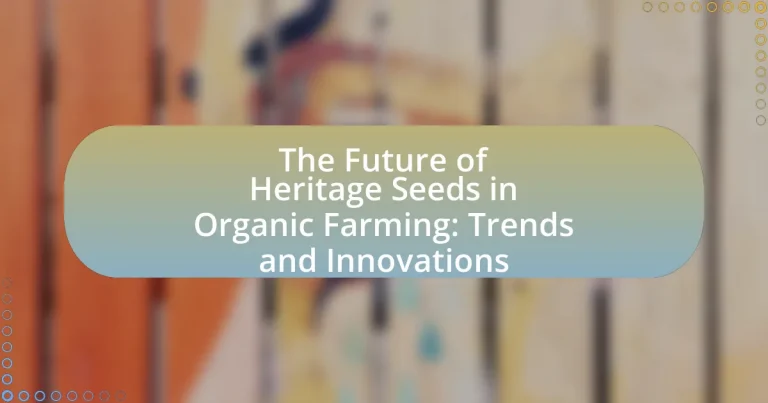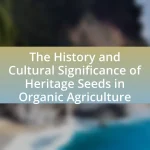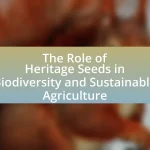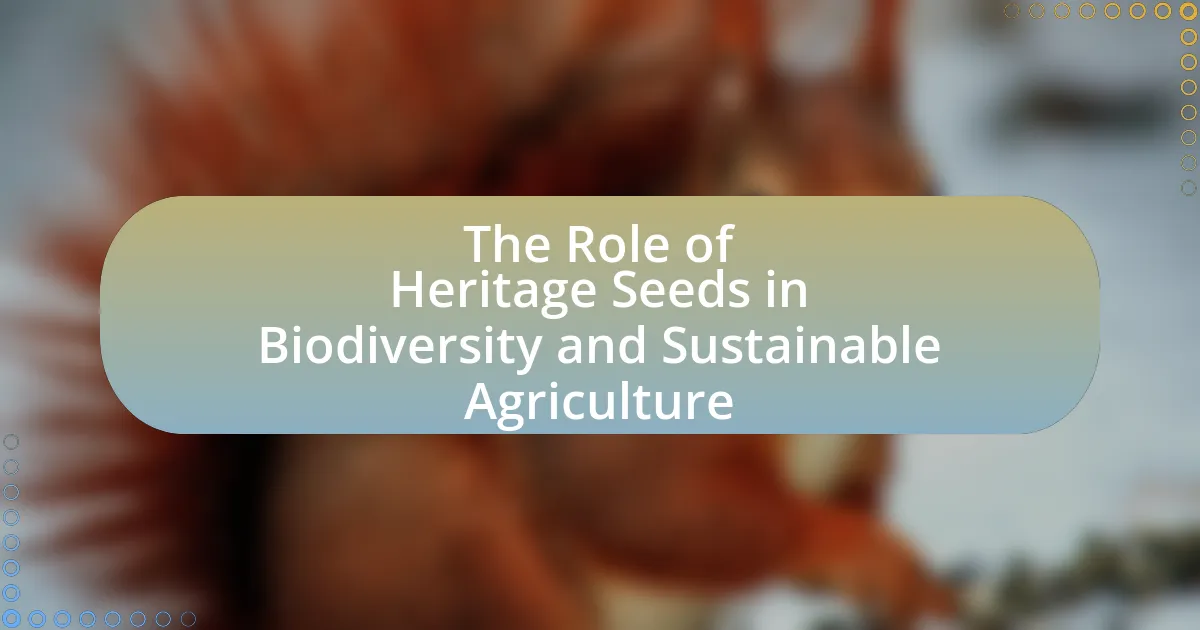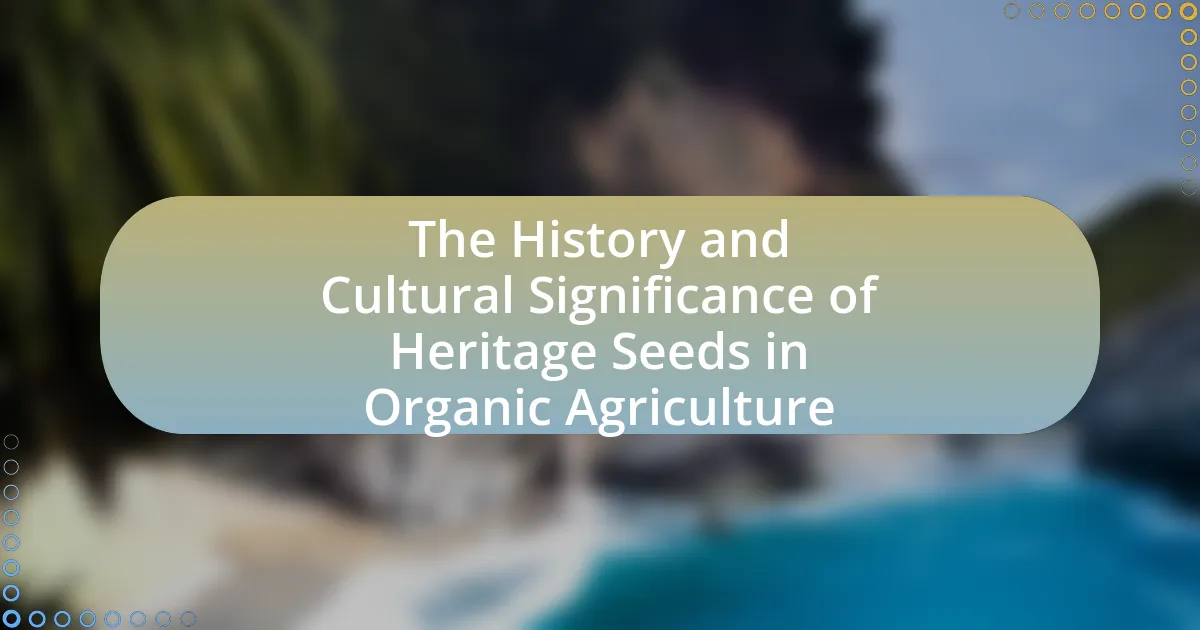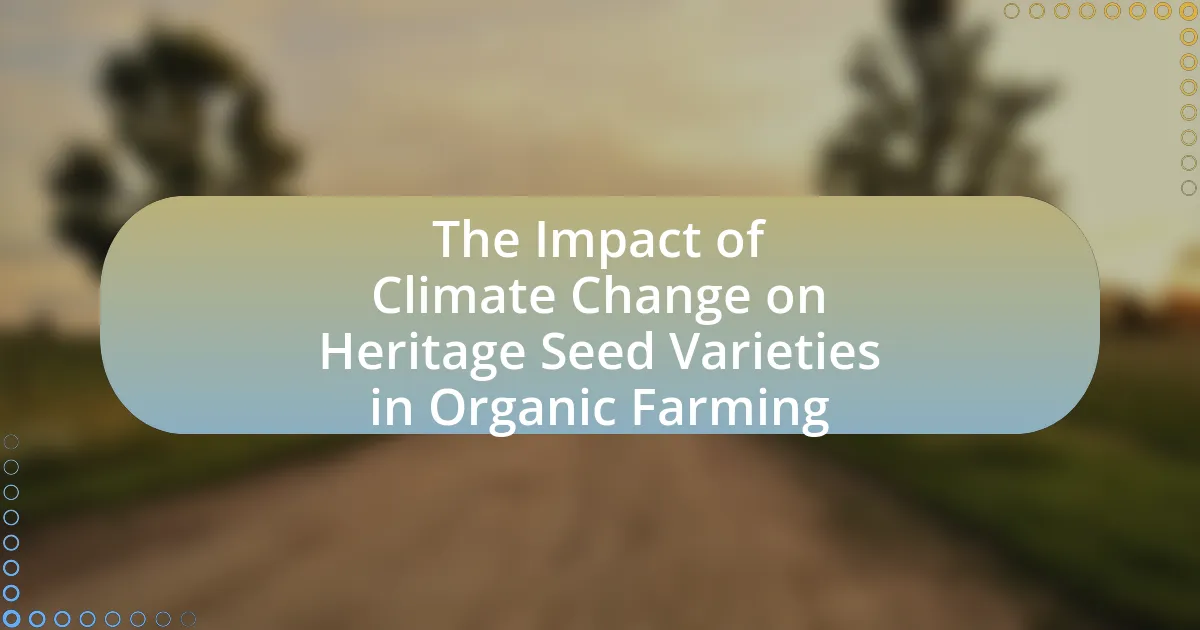Heritage seeds are traditional seed varieties that have been preserved through generations, playing a vital role in organic farming by promoting biodiversity, enhancing soil health, and providing resilient crops. This article explores the differences between heritage, hybrid, and GMO seeds, highlighting the unique characteristics and benefits of heritage seeds for organic farmers, including improved crop yields and sustainability. It also examines the challenges faced by heritage seeds, such as genetic diversity loss and market competition, while discussing emerging trends and innovations in seed preservation and cultivation practices that support the future of heritage seeds in organic agriculture.
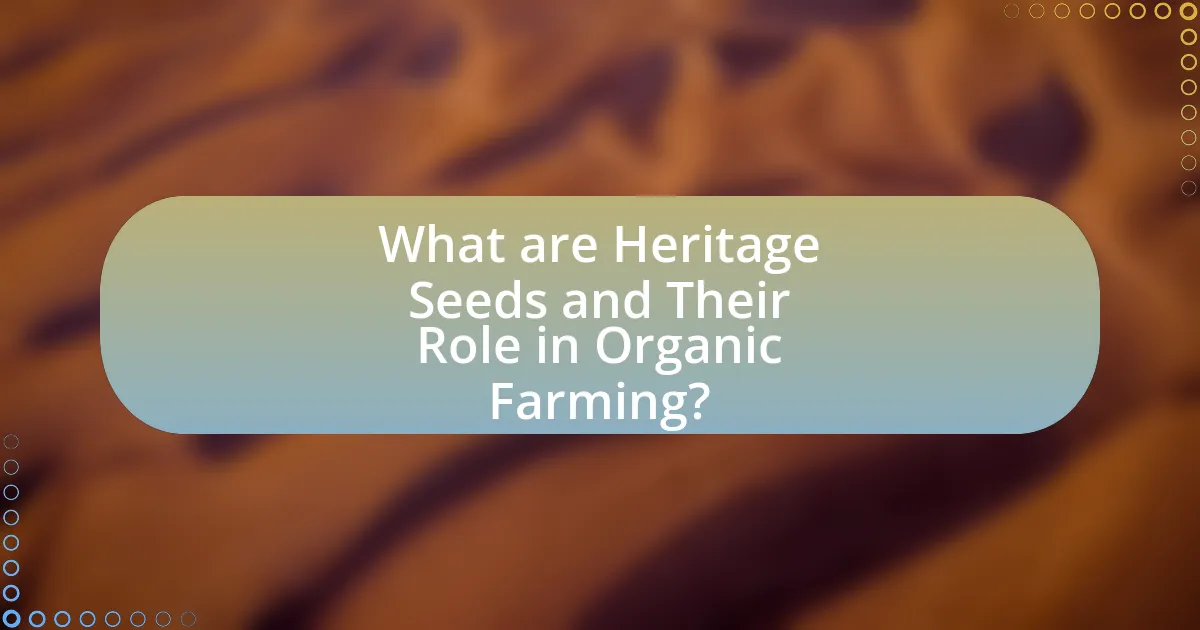
What are Heritage Seeds and Their Role in Organic Farming?
Heritage seeds are traditional seed varieties that have been passed down through generations, often characterized by their adaptability, flavor, and genetic diversity. In organic farming, heritage seeds play a crucial role by promoting biodiversity, enhancing soil health, and providing farmers with resilient crops that are better suited to local growing conditions. Research indicates that using heritage seeds can lead to improved crop yields and sustainability, as these seeds are often more resistant to pests and diseases compared to modern hybrids. Furthermore, heritage seeds contribute to the preservation of agricultural heritage and cultural identity, making them vital for the future of sustainable farming practices.
How do heritage seeds differ from hybrid and GMO seeds?
Heritage seeds differ from hybrid and GMO seeds primarily in their genetic makeup and breeding processes. Heritage seeds are open-pollinated varieties that have been passed down through generations, maintaining genetic diversity and traits that are well-suited to local environments. In contrast, hybrid seeds are created through controlled cross-pollination of two different parent plants, resulting in offspring that often exhibit specific desirable traits but may not be stable over generations. GMO seeds, or genetically modified organisms, involve direct manipulation of an organism’s DNA using biotechnology to introduce specific traits, such as pest resistance or herbicide tolerance. This fundamental difference in breeding methods leads to variations in genetic stability, adaptability, and ecological impact, with heritage seeds often being favored in organic farming for their sustainability and resilience.
What characteristics define heritage seeds?
Heritage seeds are defined by their ability to be open-pollinated, which allows them to reproduce true to type in subsequent generations. These seeds are typically non-hybrid, meaning they have not been genetically modified or altered through modern breeding techniques. Heritage seeds often possess a rich genetic diversity, which contributes to their resilience against pests and diseases. Additionally, they are usually heirloom varieties that have been passed down through generations, often selected for their flavor, adaptability, and suitability to local growing conditions. This historical significance and traditional cultivation methods further reinforce their value in sustainable agriculture.
Why are heritage seeds important for biodiversity?
Heritage seeds are crucial for biodiversity because they preserve genetic diversity within plant species, which is essential for ecosystem resilience. These seeds represent traditional varieties that have adapted to local environments over generations, contributing to a wider gene pool. This genetic diversity allows crops to withstand pests, diseases, and changing climate conditions, thereby ensuring food security. For instance, a study by the Food and Agriculture Organization (FAO) highlights that maintaining diverse seed varieties can enhance agricultural productivity and sustainability, as diverse crops are more resilient to environmental stresses.
What benefits do heritage seeds provide to organic farmers?
Heritage seeds provide organic farmers with increased biodiversity, resilience to pests and diseases, and improved flavor and nutritional value in crops. These seeds are often well-adapted to local growing conditions, which enhances their ability to thrive without synthetic inputs. Research indicates that heritage varieties can yield better under organic farming practices due to their natural adaptability, as evidenced by studies showing that heirloom tomatoes have higher antioxidant levels compared to hybrid varieties. Additionally, using heritage seeds supports sustainable agriculture by preserving genetic diversity, which is crucial for food security and ecosystem health.
How do heritage seeds contribute to soil health?
Heritage seeds contribute to soil health by promoting biodiversity and enhancing soil structure. These seeds, which are open-pollinated and adapted to local conditions, support a diverse range of plant species that can improve soil microbial activity and nutrient cycling. Research indicates that diverse plant communities can lead to healthier soils by increasing organic matter and reducing erosion. For instance, a study published in the journal “Agriculture, Ecosystems & Environment” found that crop diversity, including heritage varieties, significantly improved soil organic carbon levels, which is crucial for soil fertility and overall health.
What economic advantages do heritage seeds offer?
Heritage seeds offer significant economic advantages, primarily through their resilience and adaptability, which can lead to reduced costs for farmers. These seeds are often more resistant to pests and diseases, minimizing the need for chemical inputs and lowering overall production costs. Additionally, heritage seeds can yield higher prices in niche markets due to their unique flavors and qualities, which appeal to consumers seeking organic and locally sourced products. Research indicates that farmers using heritage seeds can achieve better market premiums, as evidenced by a study from the University of California, which found that heirloom varieties can sell for up to 50% more than conventional crops. This combination of lower input costs and higher market value contributes to the economic viability of heritage seeds in organic farming.
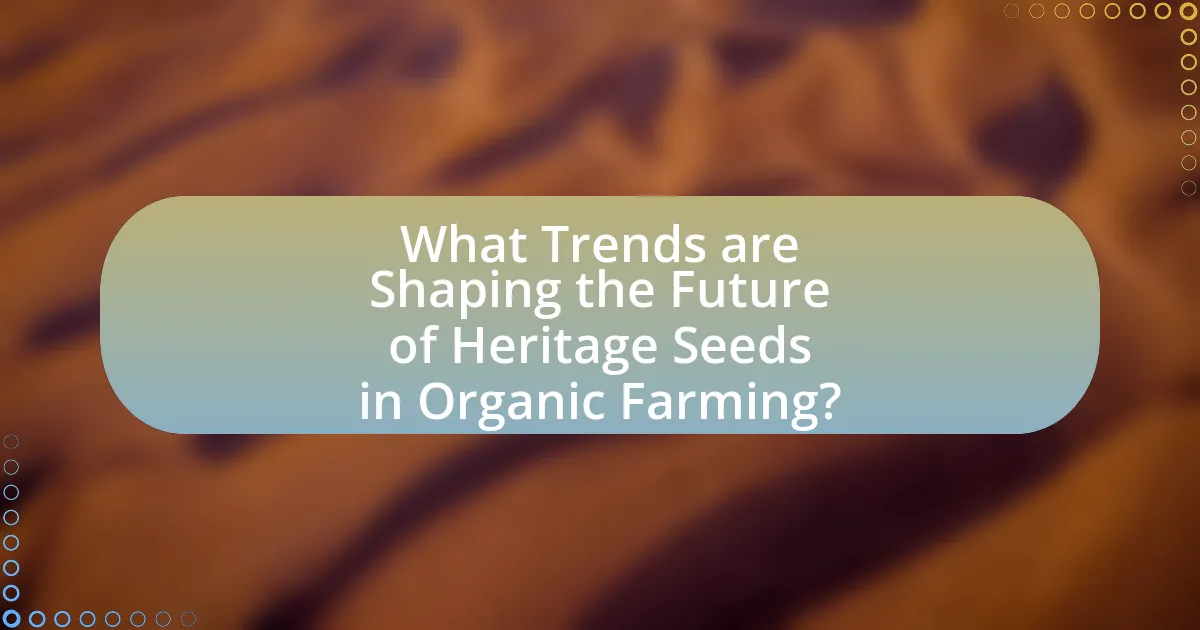
What Trends are Shaping the Future of Heritage Seeds in Organic Farming?
The future of heritage seeds in organic farming is being shaped by trends such as increased consumer demand for biodiversity, a focus on sustainable agriculture practices, and the rise of seed saving initiatives. Increased consumer awareness about the nutritional and ecological benefits of heritage seeds drives farmers to adopt these varieties, as they often exhibit greater resilience to pests and diseases. Additionally, sustainable agriculture practices emphasize the importance of preserving genetic diversity, which heritage seeds provide, thereby enhancing soil health and ecosystem stability. Seed saving initiatives, supported by organizations and community groups, encourage farmers to cultivate and share heritage seeds, fostering a culture of sustainability and self-reliance in farming communities. These trends collectively contribute to the revitalization of heritage seeds, ensuring their relevance in the future of organic farming.
How is consumer demand influencing heritage seed cultivation?
Consumer demand is significantly influencing heritage seed cultivation by driving farmers to prioritize the production of diverse, traditional varieties that appeal to health-conscious and environmentally aware consumers. This shift is evidenced by the increasing popularity of organic markets, where consumers actively seek out heritage seeds for their unique flavors, nutritional benefits, and sustainable farming practices. According to a report by the Organic Trade Association, organic food sales reached $62 billion in 2020, reflecting a growing consumer preference for products that support biodiversity and local agriculture, thereby encouraging farmers to cultivate heritage seeds.
What role does sustainability play in consumer choices?
Sustainability significantly influences consumer choices by driving demand for environmentally friendly products. Consumers increasingly prioritize sustainable practices, such as organic farming, which is evident in the growing market for heritage seeds that promote biodiversity and ecological balance. Research indicates that 66% of global consumers are willing to pay more for sustainable brands, highlighting the importance of sustainability in purchasing decisions. This trend reflects a broader shift towards valuing products that contribute to environmental health and social responsibility.
How are farmers responding to changing consumer preferences?
Farmers are adapting to changing consumer preferences by increasingly adopting organic farming practices and diversifying their crop selections. This shift is driven by a growing demand for organic produce, which has seen a 12% annual growth rate in the U.S. market from 2019 to 2021, according to the Organic Trade Association. Additionally, many farmers are incorporating heritage seeds into their cultivation to meet consumer interest in unique flavors and sustainable practices, as these seeds often offer better resilience and biodiversity. This response aligns with consumer trends favoring transparency and sustainability in food sourcing.
What innovations are emerging in the preservation of heritage seeds?
Innovations in the preservation of heritage seeds include the use of cryopreservation techniques, which allow seeds to be stored at extremely low temperatures to maintain viability for extended periods. This method has been validated by studies showing that seeds stored in liquid nitrogen can remain viable for decades, significantly extending their preservation lifespan. Additionally, advances in molecular biology, such as DNA barcoding, enable the accurate identification and tracking of heritage seed varieties, ensuring genetic diversity is maintained. These innovations are crucial for safeguarding biodiversity and supporting sustainable agricultural practices in organic farming.
How are technology and research enhancing seed preservation methods?
Technology and research are enhancing seed preservation methods through advanced techniques such as cryopreservation, genetic analysis, and biobanking. Cryopreservation allows seeds to be stored at extremely low temperatures, significantly extending their viability; for instance, studies have shown that seeds can remain viable for decades when stored in liquid nitrogen. Genetic analysis enables the identification of genetic diversity and traits that are crucial for adaptation and resilience, which is essential for preserving heritage seeds. Additionally, biobanking initiatives, like those conducted by the Global Seed Vault in Svalbard, ensure that a wide variety of seeds are preserved for future generations, safeguarding against loss due to climate change or other environmental factors. These methods collectively contribute to the sustainability and resilience of agricultural systems, particularly in organic farming.
What partnerships are forming to support heritage seed initiatives?
Partnerships forming to support heritage seed initiatives include collaborations between non-profit organizations, agricultural universities, and local farming communities. For example, the Seed Savers Exchange partners with various educational institutions to promote the preservation of heirloom varieties through research and community engagement. Additionally, organizations like the Organic Seed Alliance work with farmers and seed companies to enhance the availability and diversity of heritage seeds, ensuring sustainable agricultural practices. These partnerships are crucial for maintaining genetic diversity and promoting organic farming methods.
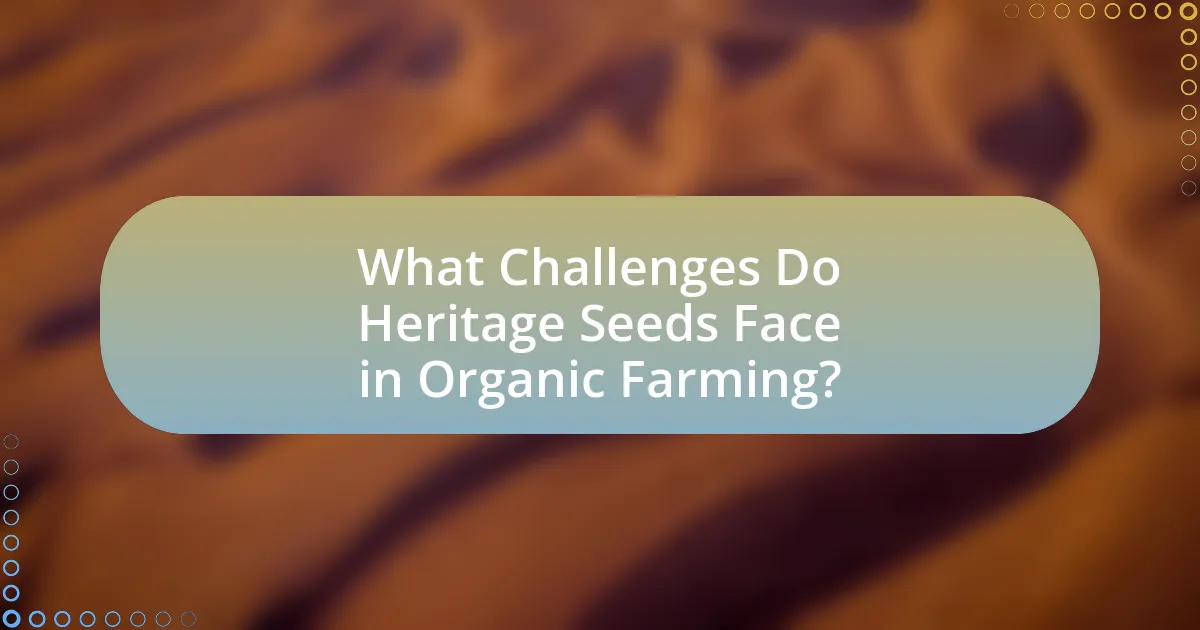
What Challenges Do Heritage Seeds Face in Organic Farming?
Heritage seeds face several challenges in organic farming, primarily including genetic diversity loss, susceptibility to pests and diseases, and market competition from hybrid and genetically modified seeds. Genetic diversity loss occurs as farmers often select a limited number of varieties for cultivation, reducing the overall resilience of crops. Additionally, heritage seeds may lack the pest and disease resistance found in modern hybrids, making them more vulnerable to agricultural threats. Market competition is significant, as many organic farmers may prefer higher-yielding hybrids that promise better economic returns, leading to decreased demand for heritage varieties. These challenges highlight the need for targeted strategies to support the cultivation and preservation of heritage seeds in organic farming systems.
How do climate change and environmental factors impact heritage seeds?
Climate change and environmental factors significantly impact heritage seeds by altering their growing conditions and genetic diversity. Rising temperatures, changing precipitation patterns, and increased frequency of extreme weather events can stress these seeds, leading to reduced yields and compromised quality. For instance, a study published in the journal “Agricultural Systems” found that heritage varieties often lack the resilience to adapt to rapid climate shifts compared to modern hybrids, which are bred for specific conditions. Additionally, environmental factors such as soil degradation and loss of biodiversity further threaten the viability of heritage seeds, as they rely on diverse ecosystems for pollination and pest control.
What strategies can farmers employ to mitigate these impacts?
Farmers can employ crop rotation, cover cropping, and integrated pest management to mitigate the impacts on heritage seeds in organic farming. Crop rotation helps maintain soil health and reduces pest and disease cycles, which is essential for preserving the genetic diversity of heritage seeds. Cover cropping enhances soil structure and fertility, providing a protective layer that prevents erosion and nutrient loss. Integrated pest management combines biological, cultural, and mechanical practices to control pests sustainably, minimizing reliance on chemical inputs. These strategies are supported by research indicating that diverse cropping systems can enhance resilience against climate change and pests, ultimately benefiting heritage seed preservation.
How does pest resistance vary among heritage seed varieties?
Pest resistance among heritage seed varieties varies significantly due to genetic diversity and adaptation to local environments. Heritage seeds, often derived from traditional agricultural practices, exhibit a range of resistance traits that have evolved over generations, allowing them to withstand specific pests prevalent in their regions. For instance, certain heirloom tomato varieties have shown increased resistance to common pests like aphids and hornworms, attributed to their unique genetic makeup and historical cultivation methods. Research indicates that these varieties can possess natural pest-repellent compounds, enhancing their resilience compared to modern hybrids, which may rely more on chemical treatments. This genetic variation is crucial for organic farming, as it promotes biodiversity and reduces dependency on synthetic pesticides, aligning with sustainable agricultural practices.
What regulatory challenges affect the use of heritage seeds?
Regulatory challenges affecting the use of heritage seeds include stringent seed certification processes, restrictions on seed saving, and compliance with intellectual property laws. These regulations often require heritage seeds to meet specific quality standards, which can be difficult for small-scale farmers to achieve. Additionally, many countries have laws that limit the ability of farmers to save and replant seeds from their harvests, undermining traditional practices associated with heritage seeds. Intellectual property laws, such as patents on genetically modified organisms, can further complicate the landscape, as they may restrict the use of certain heritage varieties that have been crossbred with patented crops.
How can farmers navigate seed certification processes?
Farmers can navigate seed certification processes by understanding the specific requirements set by regulatory bodies and maintaining accurate records of their seed production. Familiarity with local and national regulations, such as those outlined by the Association of Official Seed Certifying Agencies, is crucial for compliance. Additionally, farmers should engage with seed certification agencies to clarify procedures and seek guidance on best practices, ensuring that their seeds meet quality standards. This approach is supported by the fact that certified seeds often lead to higher yields and better market access, as evidenced by studies showing that certified seeds can increase crop productivity by up to 20%.
What role do policies play in supporting heritage seed farming?
Policies play a crucial role in supporting heritage seed farming by establishing legal frameworks that protect biodiversity and promote sustainable agricultural practices. These policies can include regulations that safeguard traditional seed varieties from patenting, ensuring that farmers retain the right to save and exchange seeds. For instance, the International Treaty on Plant Genetic Resources for Food and Agriculture encourages the conservation and sustainable use of plant genetic resources, which directly benefits heritage seed farming. Additionally, government incentives and funding programs can support farmers who choose to cultivate heritage seeds, thereby enhancing food security and preserving agricultural heritage.
What Best Practices Can Farmers Adopt for Successful Heritage Seed Cultivation?
Farmers can adopt several best practices for successful heritage seed cultivation, including selecting locally adapted varieties, practicing crop rotation, and maintaining soil health through organic amendments. Selecting locally adapted heritage seeds ensures better resilience to local pests and diseases, as these varieties have evolved in specific environments. Crop rotation helps prevent soil depletion and reduces the risk of disease buildup, promoting biodiversity. Additionally, maintaining soil health through organic amendments, such as compost and cover crops, enhances nutrient availability and soil structure, which is crucial for the growth of heritage seeds. These practices are supported by research indicating that diverse cropping systems and healthy soils lead to improved yields and sustainability in organic farming.
How can farmers effectively select and save seeds for future planting?
Farmers can effectively select and save seeds for future planting by choosing seeds from the healthiest and most productive plants in their fields. This practice ensures that the seeds carry desirable traits such as disease resistance and high yield. To save seeds, farmers should allow the selected plants to mature fully, harvest the seeds at the right time, and properly dry and store them in a cool, dark place to maintain viability. Research indicates that seeds saved from well-adapted plants can improve crop performance over generations, as demonstrated in studies on heirloom varieties, which show enhanced resilience and adaptability in organic farming systems.
What techniques enhance the growth and yield of heritage seeds?
Techniques that enhance the growth and yield of heritage seeds include crop rotation, companion planting, organic soil amendments, and integrated pest management. Crop rotation improves soil health and reduces pest buildup, while companion planting can enhance nutrient uptake and deter pests. Organic soil amendments, such as compost and green manure, enrich the soil with essential nutrients, promoting robust plant growth. Integrated pest management employs biological controls and natural pesticides to protect crops without harming beneficial organisms. Research indicates that these techniques can significantly increase yields and improve the resilience of heritage seed varieties in organic farming systems.
